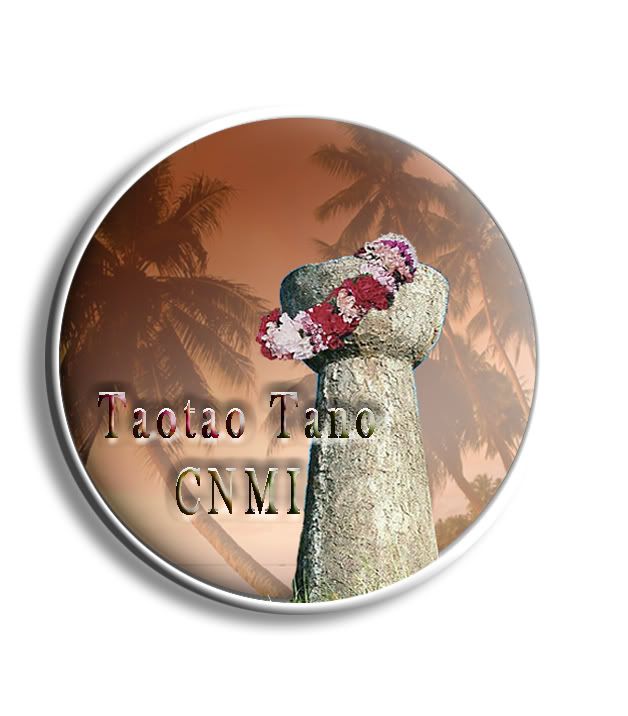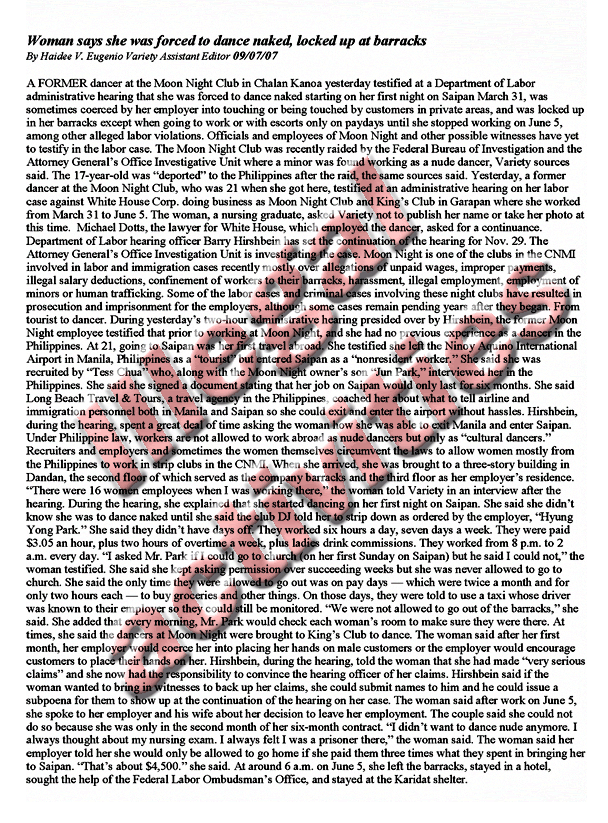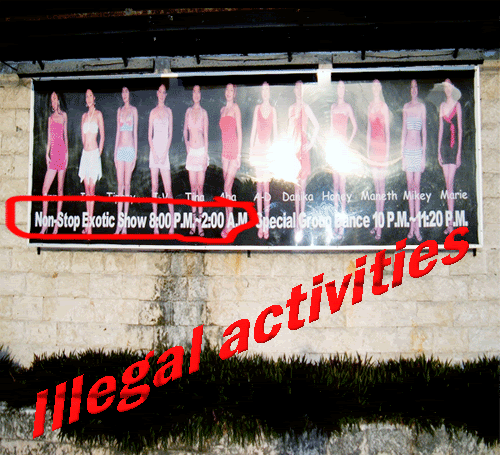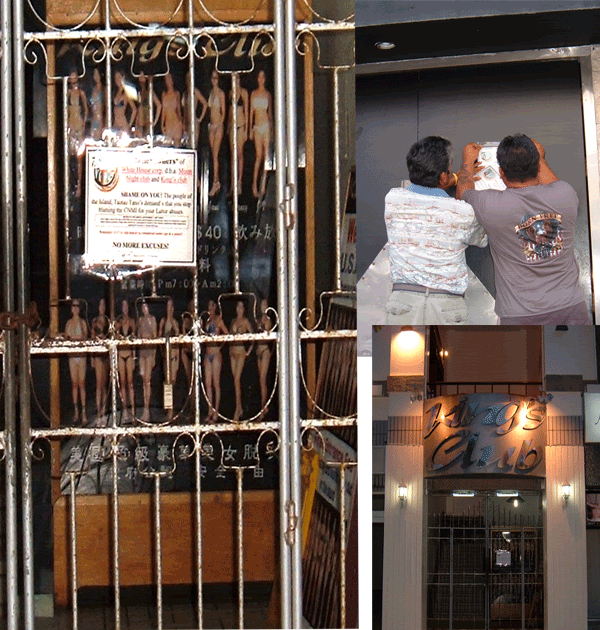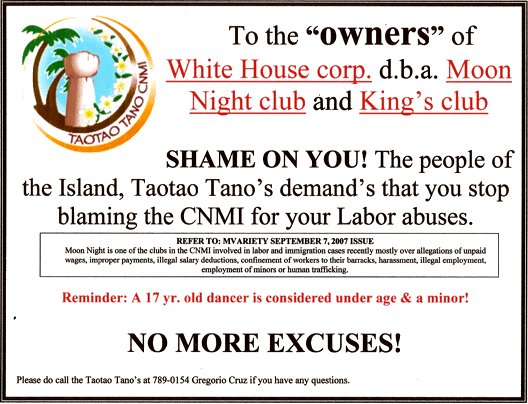Signing of HB 15-38 into law - PL 15-108
Links
While law In Process
Guest Workers
Dekada Movement counsel Stephen Woodruff
BENEDETTO
TINA SABLAN & Propts movement
Indigenous Community Opinion
TAOTAO TANO OPINION
TAOTAO TANO Follow up
- Next meeting: 040208
- 032108 Taotao Tano attends secret meeting on CNMI Residency
Monday, March 24, 2008
HUH?
Marianas Variety
http://www.mvariety.com/?module=displaystory&story_id=8771&format=html
Letter to the Editor: Huh?
I HAVE been following the wage hike debate. I must say that I am in agreement with the need to increase the minimum wage in the CNMI, but not for the reasons so stated by Jerry Custodio in his recent letter to the editor.
Mr. Custodio states that there is a “struggle for justice” and the guest workers have “long been suffering from a $3.55 minimum wage.” I don’t get it. Assuming that he comes from the Philippines, I wonder if he would rather work for under a buck an hour and not have any benefits, short of maybe a meal and transportation allowance — that is if he is lucky enough to land a job there. And if he gets sick or injured, he’s on his own. I wonder if Mr. Custodio has written any letters to his own president and Congress to complain about the injustice in the Philippines and abuse of workers.
I would say that for an average worker from China or the Philippines, Saipan is a workers paradise. For the most part, free housing, free transportation, free uniforms, free medical, free trip back and forth home, Free food sometimes, and $3.55 an hour to boot. And don’t forget the free food stamps that you get for your babies that are born in the CNMI. Please, don’t complain to me about American injustice, because I don’t see it.
I believe that the minimum wage should increase for the benefit of American citizens. At the very least, American’s should be paid equity to compensate for the “benefits” paid already to non-Americans on top of their salary. As wages increase, more and more qualified American’s will be willing to fill the jobs.
So Mr. Custodio, don’t complain to me about America or the CNMI being unjust to you because we only pay $3.55 an hour to you. I doubt that you speak for all non-resident workers as your letter states. If you worked for me, and you were worthy, you would be earning $6 or $7 or more, if I couldn’t fill the position with an American.
Just because you have given up hope in your own country, you should be grateful that my country gave you a job and opportunity. And if there is more “justice” for you somewhere else, why in the world are you still here? It seem like the popular thing these days is for the world to bash America. I for one am getting damned tired of it. Talk to me again on the day that poor people in the Philippines can get food stamps from their own government.
PAUL TROMBETTA
http://www.mvariety.com/?module=displaystory&story_id=8771&format=html
Letter to the Editor: Huh?
I HAVE been following the wage hike debate. I must say that I am in agreement with the need to increase the minimum wage in the CNMI, but not for the reasons so stated by Jerry Custodio in his recent letter to the editor.
Mr. Custodio states that there is a “struggle for justice” and the guest workers have “long been suffering from a $3.55 minimum wage.” I don’t get it. Assuming that he comes from the Philippines, I wonder if he would rather work for under a buck an hour and not have any benefits, short of maybe a meal and transportation allowance — that is if he is lucky enough to land a job there. And if he gets sick or injured, he’s on his own. I wonder if Mr. Custodio has written any letters to his own president and Congress to complain about the injustice in the Philippines and abuse of workers.
I would say that for an average worker from China or the Philippines, Saipan is a workers paradise. For the most part, free housing, free transportation, free uniforms, free medical, free trip back and forth home, Free food sometimes, and $3.55 an hour to boot. And don’t forget the free food stamps that you get for your babies that are born in the CNMI. Please, don’t complain to me about American injustice, because I don’t see it.
I believe that the minimum wage should increase for the benefit of American citizens. At the very least, American’s should be paid equity to compensate for the “benefits” paid already to non-Americans on top of their salary. As wages increase, more and more qualified American’s will be willing to fill the jobs.
So Mr. Custodio, don’t complain to me about America or the CNMI being unjust to you because we only pay $3.55 an hour to you. I doubt that you speak for all non-resident workers as your letter states. If you worked for me, and you were worthy, you would be earning $6 or $7 or more, if I couldn’t fill the position with an American.
Just because you have given up hope in your own country, you should be grateful that my country gave you a job and opportunity. And if there is more “justice” for you somewhere else, why in the world are you still here? It seem like the popular thing these days is for the world to bash America. I for one am getting damned tired of it. Talk to me again on the day that poor people in the Philippines can get food stamps from their own government.
PAUL TROMBETTA
Saturday, February 2, 2008
Letter to the editor: To Rep. Tina Sablan
mv-Editorials Wednesday January 23, 2008
Letter to the editor: To Rep. Tina Sablan
PUBLIC Law 15-108 is a good law authored by the Honorable Congresswoman Cinta Kaipat. Everyone was given ample time to submit comments and we believe that the Department of Labor announced an extended 30 days for comments to be submitted. You have only been in office less than two weeks and this is your priority. Obviously you do not represent your constituents.
For many years, our elected leaders in the past and, of course, presently have neglected addressing our labor and immigration loopholes and flaws in our system in which everyone benefited from, and now that it’s locked down you are opposing the contents of the law. Ms. Sablan, this you have expressed loudly during all your forums prior to being elected.
One of your highest priorities in your platform was to address and prevent lawmakers from habitual amendments after amendments of laws. Now that you are a freshman lawmaker, you are no different! In fact worse. Are you now going back on your own words? The same way you did when you deceived the voters of Precinct 1?
Taotao Tano supported this law since the day it was first introduced to the day it was signed into law. The law addresses all the major problems in our labor and immigration system including prioritizing all locals and U.S. citizens in terms of employment.
Now, as for your civil rights activism here in our homeland, I ask you to refrain from using the names of the great Dr. Martin Luther King and Ghandi for your misunderstanding and misguidance are now tarnishing their great names and work.
The one thing I do know about these great people is that they never deceived their own people for their own personal gain.
GREGORIO CRUZ
President
Letter to the editor: To Rep. Tina Sablan
PUBLIC Law 15-108 is a good law authored by the Honorable Congresswoman Cinta Kaipat. Everyone was given ample time to submit comments and we believe that the Department of Labor announced an extended 30 days for comments to be submitted. You have only been in office less than two weeks and this is your priority. Obviously you do not represent your constituents.
For many years, our elected leaders in the past and, of course, presently have neglected addressing our labor and immigration loopholes and flaws in our system in which everyone benefited from, and now that it’s locked down you are opposing the contents of the law. Ms. Sablan, this you have expressed loudly during all your forums prior to being elected.
One of your highest priorities in your platform was to address and prevent lawmakers from habitual amendments after amendments of laws. Now that you are a freshman lawmaker, you are no different! In fact worse. Are you now going back on your own words? The same way you did when you deceived the voters of Precinct 1?
Taotao Tano supported this law since the day it was first introduced to the day it was signed into law. The law addresses all the major problems in our labor and immigration system including prioritizing all locals and U.S. citizens in terms of employment.
Now, as for your civil rights activism here in our homeland, I ask you to refrain from using the names of the great Dr. Martin Luther King and Ghandi for your misunderstanding and misguidance are now tarnishing their great names and work.
The one thing I do know about these great people is that they never deceived their own people for their own personal gain.
GREGORIO CRUZ
President
Friday, January 18, 2008
Hodges' distortions are shameful
011908 st -Letters to the Editor Saturday, January 19, 2008
H.R. 3079, the federalization bill now pending in the U.S. Senate, does indeed deport every single foreign worker from the Commonwealth. That bill is awaiting action by a Senate that doesn't know much about the Commonwealth and, for that reason, may pass the bill. Let's make this clear: EVERY FOREIGN WORKER IN THE COMMONWEALTH WILL BE DEPORTED WITHIN FIVE YEARS OF PASSAGE OF THE FEDERALIZATION BILL. There are no exceptions. It is possible, as Pete A. says, that there will be an extension of another five years. But the Marianas will have no say in that. It is the intent of the federalization bill, and those like Mr. Hodges who support it, to deport every single foreign worker, bar none, from the Marianas.
The new Commonwealth labor law, P.L. 15-108, welcomes foreign workers, as the Commonwealth always has, and improves their working conditions and protections to a standard virtually unmatched anywhere else in the world. Tell me, where in the world do foreign workers get guaranteed medical coverage? Nowhere. And where in the world do foreign workers get bonded protection that their wages will be paid? Nowhere. One could go on and on. Mr. Hodges’ comparison to Hitler is despicable!
And let's look at the treatment of minors. Mr. Hodges is once again not only wrong, but so terribly wrong that one has to conclude his efforts are deliberate propaganda to slander the U.S. citizens who are of Chamorro and Carolinian heritage. What do you suppose Mr. Hodges is doing in the classroom? Maybe we need parent monitors in his classroom to be sure nothing like this unfounded hateful propaganda is going on there.
Here's the deal. Under H.R. 3079, the federalization law, when all foreign workers are deported, all U.S. citizen children will likely go with them unless they have U.S. citizen or permanent relative residents in the U.S. somewhere. Under U.S. law, when a foreign worker is forced to leave, he or she may petition the U.S. immigration officials for what they call “cancellation of removal” but the foreign worker will have to show “exceptional and extremely unusual hardship” to their U.S. citizen son or daughter. It is very difficult to meet this standard. (See, for example, the decision in In re Ariadna Gonzalez Recinas, et al., Respondent, file A75 696 573 (Los Angeles), decided Sept. 19, 2002, by the Board of Immigration Appeals.) If the foreign worker has any relatives or any resources in their home country, or any capacity to earn a living there, however small, the U.S. will not allow them to stay, no matter what hardship may occur to their U.S. citizen children from the move to the home country.
Under PL 15-108, the Commonwealth labor law, foreign workers will be required to leave the Commonwealth only for 60 days, once every three years, if the foreign worker is an employee of a qualifying employer and for six months, once every three years, if the foreign worker is an employee of a non-qualifying employer. If a foreign worker meets this periodic exit requirement (perhaps during the children's summer school vacation), the foreign worker can remain in the Commonwealth for as long as they are employed.
The new labor law is now in effect. I urge Mr. Hodges to take the time to read it, as he has obviously not done. The regulations under the new law will come into effect on Feb. 1, 2008. Similarly, I urge Mr. Hodges to read the regulations as they apply to the periodic exit. Anyone can see that the Commonwealth law is quite generous, especially compared to U.S. law. Nothing in PL 15-108 deprives any foreign worker of any aspect of belonging in the community. That is certainly more than one can say for “federalization” which has, from the beginning, divided the community, pitted foreign workers against U.S. citizens, and generally aroused negative feelings on both sides. Shame on Mr. Hodges and equal shame on federal officials who told foreign workers that “federalization” would benefit them.
Cinta M. Kaipat
Author of PL 15-108
H.R. 3079, the federalization bill now pending in the U.S. Senate, does indeed deport every single foreign worker from the Commonwealth. That bill is awaiting action by a Senate that doesn't know much about the Commonwealth and, for that reason, may pass the bill. Let's make this clear: EVERY FOREIGN WORKER IN THE COMMONWEALTH WILL BE DEPORTED WITHIN FIVE YEARS OF PASSAGE OF THE FEDERALIZATION BILL. There are no exceptions. It is possible, as Pete A. says, that there will be an extension of another five years. But the Marianas will have no say in that. It is the intent of the federalization bill, and those like Mr. Hodges who support it, to deport every single foreign worker, bar none, from the Marianas.
The new Commonwealth labor law, P.L. 15-108, welcomes foreign workers, as the Commonwealth always has, and improves their working conditions and protections to a standard virtually unmatched anywhere else in the world. Tell me, where in the world do foreign workers get guaranteed medical coverage? Nowhere. And where in the world do foreign workers get bonded protection that their wages will be paid? Nowhere. One could go on and on. Mr. Hodges’ comparison to Hitler is despicable!
And let's look at the treatment of minors. Mr. Hodges is once again not only wrong, but so terribly wrong that one has to conclude his efforts are deliberate propaganda to slander the U.S. citizens who are of Chamorro and Carolinian heritage. What do you suppose Mr. Hodges is doing in the classroom? Maybe we need parent monitors in his classroom to be sure nothing like this unfounded hateful propaganda is going on there.
Here's the deal. Under H.R. 3079, the federalization law, when all foreign workers are deported, all U.S. citizen children will likely go with them unless they have U.S. citizen or permanent relative residents in the U.S. somewhere. Under U.S. law, when a foreign worker is forced to leave, he or she may petition the U.S. immigration officials for what they call “cancellation of removal” but the foreign worker will have to show “exceptional and extremely unusual hardship” to their U.S. citizen son or daughter. It is very difficult to meet this standard. (See, for example, the decision in In re Ariadna Gonzalez Recinas, et al., Respondent, file A75 696 573 (Los Angeles), decided Sept. 19, 2002, by the Board of Immigration Appeals.) If the foreign worker has any relatives or any resources in their home country, or any capacity to earn a living there, however small, the U.S. will not allow them to stay, no matter what hardship may occur to their U.S. citizen children from the move to the home country.
Under PL 15-108, the Commonwealth labor law, foreign workers will be required to leave the Commonwealth only for 60 days, once every three years, if the foreign worker is an employee of a qualifying employer and for six months, once every three years, if the foreign worker is an employee of a non-qualifying employer. If a foreign worker meets this periodic exit requirement (perhaps during the children's summer school vacation), the foreign worker can remain in the Commonwealth for as long as they are employed.
The new labor law is now in effect. I urge Mr. Hodges to take the time to read it, as he has obviously not done. The regulations under the new law will come into effect on Feb. 1, 2008. Similarly, I urge Mr. Hodges to read the regulations as they apply to the periodic exit. Anyone can see that the Commonwealth law is quite generous, especially compared to U.S. law. Nothing in PL 15-108 deprives any foreign worker of any aspect of belonging in the community. That is certainly more than one can say for “federalization” which has, from the beginning, divided the community, pitted foreign workers against U.S. citizens, and generally aroused negative feelings on both sides. Shame on Mr. Hodges and equal shame on federal officials who told foreign workers that “federalization” would benefit them.
Cinta M. Kaipat
Author of PL 15-108
Subscribe to:
Comments (Atom)

